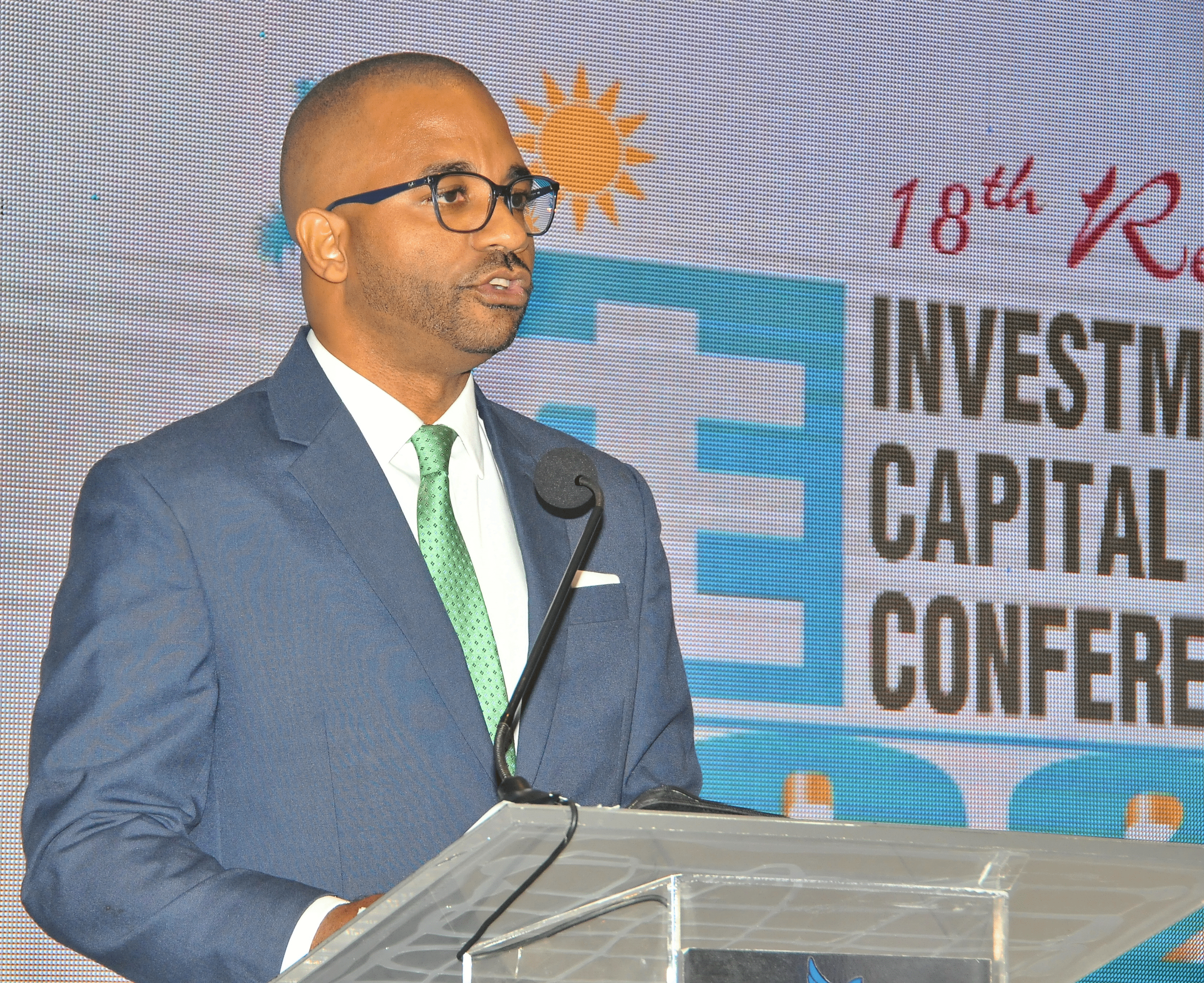This Conference was the JSE’s 18th edition. Please see below, Mr. Godden’s presentation, which we hope you enjoy reading, as much as he enjoyed bringing it to you.
We look forward to seeing you at our next Conference.
Mr. Steven Gooden’s Address
NCB Capital Markets is proud to be associated with the JSE’s annual conference for a 7th consecutive year as the lead regional sponsor. This year’s theme the “Capital Markets Redefined Achieving the Impossible” is very relevant given the global events over the past 3 years and the trends we are seeing globally, locally and I dare say regionally.
Tonight I had planned to speak on the Revival of the Entrepreneurial Spirit and the Redefinition of the capital markets…and I still will. Entrepreneurship is the engine of any economy and the capital market plays an important role in fueling that engine. I will explore the Jamaican experience and identify the lessons, which are applicable not just for Jamaica, but to the wider region as well.
However, it would be remiss of me, bordering on irresponsible, not to use this platform, as President of the Jamaica Dealers Securities Dealers Association (JSDA), to speak on the topic that is now dominating the local press. I was expecting 2023 to be a year of reprieve for the industry, having weathered the COVID-19 pandemic and the inflation crisis over the last three years. But, here we are with our own local situation, one that is threatening the reputation of our securities industry and public confidence in the financial system. As such, I will also address this in my presentation.
In the midst of this ordeal, I chose to keep my speech focused on the revival of the entrepreneurial spirit because while we as a nation solidify the transparency and security of our financial markets to rebuild confidence, the need for stronger economic growth, enhanced competitiveness, and greater job creation still exists.
A strong financial system is a key enabler of a thriving economy, which creates a high standard of living and quality of life for citizens. With that still being a goal, we must then ensure that financial markets can continue to play its role of providing resources for the innovative and productive ideas that will fuel development.
ENTREPRENEURSHIP
To start our conversation let’s look at the benefit of entrepreneurship to the economy; and I am going to focus on 3 benefits:
Firstly, entrepreneurship improves productivity as it injects the economy with a fresh batch of higher productivity firms. As such, it increases competition among existing businesses, and pushes out less-productive ones.
Secondly, entrepreneurship spurs innovation as new firms are disproportionately responsible for commercializing new innovations, particularly radical innovations that spawn entirely new markets or substantially disrupt existing markets.
Lastly, Entrepreneurship creates jobs as new and young businesses are the engine of net job creation in the economy.
LOCAL FINANCIAL CRISIS
In looking at the culture of entrepreneurship in Jamaica and how it has evolved, I am going to take us back three decades to a dark period in our economic history, that is, the financial sector crisis of the 90s. I believe it important that we understand the impact it has had on the psyche of our citizens, and what it did to the local entrepreneurial mindset.
In the early 1990s, in response to rapid depreciation in the local currency and spiraling inflation that had risen to as high as 80%, the government and the central bank sought to stabilize the economy and the exchange rate by pursuing a high- interest rate policy.
This high-interest rate policy played a meaningful role in the financial crisis of the 1990s and in subduing the entrepreneurial spirit because the interest rates at which banks lent to borrowers rose to prohibitively high levels. As the government raised interest rates to reduce liquidity in the economy, commercial banks quickly raised the rates at which they lent money to businesses.
According to BOJ data, the average lending rate for commercial banks rose from 34.5% in 1990 to 62.3% in 1994. As a matter of fact, in early 1994, a survey conducted by the Financial Gleaner revealed that banks such as Century National Bank, Jamaica Citizens Bank and Worker’s Bank were lending at rates that were as high as 65%-69% per annum.
The fallout from the financial crisis truly stifled entrepreneurship for two generations. Many businesses failed, with some entrepreneurs owing money to this day. The non-performing loans in the sector at the time accounted for 24.9% of GDP compared to the average of 1.2% over the last 5 years.
Allow me to paint a picture for you, an illustration… imagine an entrepreneur with a 15-year commercial (or residential) mortgage with a debt servicing ratio of 1.25 times, implying he has a 25% cash flow buffer to support loan payments. Let’s say that facility has a loan to value of 80%. A 20 percentage points interest rate rise, similar to what would happened in the 90s, would result in a cost of debt increase of approximately 70%…decimating his cash flows. He would likely be forever debt riddled because the recoverable value of the underlying collateral would likely be below the loan amount because of likely systemic fallout in the system.
The environment effectively killed the entrepreneurial spirit, as additionally, those that were fortunate to have liquidity opted for the easy route of placing money on fixed income securities earning high/double digit interest rates. In retrospect, one cannot blame them. Why take on the hassle and risks of running a business when your alternative is earning north of 30% per annum in relatively low risk fixed income investments?
That experience did not just kill a generation of entrepreneurs, it created a mindset of conservatism for years to come. The subsequent generation – my generation – which was either in the secondary or tertiary education system at the time, developed a conservative mindset.
The modus operandi of that generation was to do well in school so that you could land a job with a blue-chip company; preferably a firm that had international backing. Working for a small company was undesirable, becoming an entrepreneur was a no no. Entrepreneurship was a bad word and viewed as being for those that couldn’t get the desirable jobs at the time. In aggregate, I would argue, the outcomes of that period have stifled the economy for approximately two and half decades.
CURRENT ENVIRONMENT
With average GDP growth of 1.4% since Independence 60 years ago, our economy has endured some challenging times. It is these times and a spirit of flexibility/adaptability that makes us the resilient country that we are. The much needed macro-economic stability driven by reforms coming out of the more than a decade-old IMF agreement, coupled with financial sector innovation, is once again spurring entrepreneurship.
So we are we seeing today:
– many of the bright creative minds leaving the education system having the pursuit of entrepreneurship on their career roadmap. This is also reflected in the listing of a number of junior market companies controlled by individuals in their sub 40s.
– the emergence of a private equity culture, which has been enabled by the successes of our junior market and other financial innovation.
– the stock market, especially the junior market, being an avenue for entrepreneurs to raise funding to scale their operations.
– with lower interest rates and improved macroeconomic fundamentals, a lot of the so called “old money” are looking at private equity opportunities, in support of entrepreneurism, to diversify and create wealth.
The trend we are seeing currently, shouldn’t be taken lightly and must be nurtured for us to truly experience the transformation that we need as a country and deserve as a people. Jerry Moran, an American lawyer and politician, notes that “Innovation and entrepreneurship are the opportunity and best opportunity we have to grow the economy.”
RECOMMENDATIONS
With an ever changing global landscape and the accelerated pace of globalization, developing countries are at risk of seeing an increase in income inequality given changes in trade, technology and employment patterns. The last three years have seen an acceleration of these changes.
What is clear in my mind is that countries like ours must either adapt or face the consequence of being left behind. Doing nothing is not an option. With our resilience, improving macro-economic fundamentals and a renewed entrepreneurial drive, supported by an innovative financial sector, there is an opportunity to transform our economy and be on a path of a much higher rate of economic growth.
I want to share with you three themes that will be important to our success as a nation. They are:
– Identifying and leveraging competitive advantages;
– Seeking scale;
– Creating and retaining talent.
Identifying and leveraging competitive advantages
The manufacturing of goods and provision of services are becoming increasingly competitive, driven largely by technological change and scale. We have seen it play in front of our eyes: industries that were growing at phenomenal rates a few decades ago are now dead, or at best, are on life support. Travel agencies and anything print- from photos to newspapers and magazines are all becoming obsolete and are just a few examples of the disruption that is ongoing. Even our own financial services industry is being disrupted by technology, with the advances in mobile, internet and ABMs, heavily staffed banking and customer-facing financial services operations are becoming a thing of the past.
Therefore, to remain relevant, as a country we need to take some tough decisions and determine where our competitive advantages lie and what we need to focus on to transform our economy and the lives of our citizenry. Countries like Singapore, Panama and China have taken bold steps, focused on their competitive advantages and have been reaping the benefits.
At home, I often ask myself the question, why is it that the two industries that Jamaica is most known for, are among the most underinvested industries in Jamaica. Globally, Jamaica is known for track and field. Where that sport is concerned, we are to the world what Brazil is to football. Why then is Sports not a major contributor to GDP? Why are the major track and field events held in Europe and not in Jamaica?
Likewise, Jamaica is world renowned for reggae music. So why is it that so many reggae festivals are held in Europe and elsewhere but not in Jamaica? Kingston, Jamaica should be to Reggae, what Nashville Tennessee is to country music.
These are both industries that have the potential to dramatically impact the citizenry at the grass root. With focus and investment, they can ultimately help to create opportunities for economic growth, employment, and aid in addressing income inequality and by extension, some of the social ills of this country.
I actually had a dream about this. I dreamt that Jamaica in 2045 was the leading destination for global athletes, entertainers and those in the creatives, to hone their craft, live and vacation. In my dream, Jamaica’s international financial center initiative had allowed us to become the leading wealth management hub for world’s most famous athletes, irrespective of sport, and all the world’s largest wealth management firms were domiciled here.
Finding those niches and committing to them can result in transformation at scale, which takes me to the next theme, which is seeking Scale.
Scale
Jamaica has a population of 3 million people. The world population is just under 8 billion people. With globalization, enabled by technology, there is unprecedented access to a market that is almost three thousand times that of our own.
However, to be a meaningful global player, it is always better to do it as a collective. The population of the English Caribbean is twice the size of Jamaica at 6 million people. If you consider the entire Caribbean, we are speaking of a population of 44 million, which is a decent size. Collectively that is larger than the Canadian population, almost as large as Spain’s and two thirds the size of the United Kingdom.
As a collective, we have enough similarities and differences to make us a potent force on a global level. I am encouraged by the work being done by the Caribbean Private Sector Organization (CPSO), whose Agenda is that of supporting the full implementation of the CARICOM Single Market and Economy (CSME) and advancing Private Sector priorities in the Caribbean Community.
One of the recent initiatives of the CPSO is to bring together the regional capital markets. A topic that is back on the front burner, and I note Dr. Street-Forrest’s remarks earlier and that discussions also took place at the Trinidad & Tobago Stock Exchange’s conference in October last year. A notion of a regional exchange and/or market have been on the table for years; however, the relevance of such a construct couldn’t be more timely.
Talent
And finally, on the matter of the theme of talent – one of the biggest challenges post-pandemic is the global labor shortage and the prevalence of remote work. There are two aspects of this conversation. There is ensuring that we have the right competencies to take our economy to the next level; then there is the retention of same because being able to retain talent is just as important to our success as creating it.
The global shortage of labour in critical job functions poses a significant threat to countries like Jamaica that is large and sophisticated enough to be a hunting ground for talent. Historically, talent has migrated to other countries for more attractive compensation. With the increasing prevalence of remote work, we are now seeing international firms offering local talent attractive job opportunities, with them not having to migrate. The next effect of this is greater talent scarcity and upward pressure on wages, which can be problematic for businesses that can’t scale. This is a real threat that is not going away. As such, we not only just need to be aware of it, we need to convert it into an opportunity.
To benefit from the developments in the global economy and truly transform our economy, it is clear that Jamaica, and I dare say the region, cannot maintain the current status quo. In Jamaica, after taking a hit during the financial crisis of the 1990s, we are now seeing the revival of the entrepreneurial spirit aided by relatively low interest rates and financial innovation that has both reduced the cost of capital and increased the types of capital that is available.
However, given the trends that we are seeing in the international marketplace, to take advantage of this revival and the innovation that we are seeing in the financial services industry, we need to focus on these three themes – identifying and leveraging our competitive advantages, seeking scale and creating and retaining talent. I believe, ladies and gentlemen, that these three themes are the keys to the economic transformation we seek.
MULTI-BILLION DOLLAR FRAUD
Now shifting gears, to what has been making the daily headlines recently – the alleged multibillion occupational fraud that occurred at a securities firm in Jamaica. The incident is of grave concern to us as an industry. It is painful and heartbreaking, and unfortunately, it has set us back as a financial sector.
This incident, which is threatening confidence in the financial sector, does not reflect the state nor conduct of the securities industry as a whole. While fraud will never disappear, fraud of the magnitude that has been alleged, would not happen at a firm with a strong, well-functioning governance framework. In this instance, based on what is in the media, there appears to have been a significant break down in controls and governance.
The industry, as we know it today, has been around for almost three decades having withstood:
– The 2008 global financial crisis;
– The 2010 and 2013 local debt exchanges; and
– The fallout associated with the global pandemic, and more recently, the inflation crisis.
In all instances, during that period, the sector remained resilient, supported by ample capital and liquidity, with no systemic or entity failures. We are the same industry that has been noted for innovation and that has put Jamaica on the global map.
Our industry is plugged into the international markets, having adopted best practices in terms of processes, controls and governance. We are talking about world class settlement and custody platforms, and frameworks, driven by the use of best in class technology. All these technologies reduce the need for human intervention and as such reduces fraud. As such, it is not a surprise that historically, fraud in the sector is minimal.
The alleged incident is unfortunate; however, I cannot overemphasize that as individual firms and as a collective, we take fraud seriously and are against any activity that undermines the credibility of and confidence in the sector.
The Minister of Finance, the Dr. the Hon Nigel Clarke, at his press conference held yesterday, outlined sweeping changes to come, which includes the creation of a single regulator for prudential supervision; a role which is to be ultimately assumed by the central bank.
The JSDA supports actions geared towards restoring confidence in the securities market, as this is needed for us to the continue the contributions that the industry has been making over the past decade plus in building wealth for Jamaicans and providing capital to support the growth of businesses, the transformation of industries and the expansion of the Jamaican economy.
As an industry, our focus will now be on helping to restore public confidence and active engagement of the authorities during the consultation process over the next several months, as they seek to craft the new regulatory framework. This consultation process is critical as we seek to ensure that the outcome results in a healthy balance between prudential monitoring and that of continued market development and deepening.
There is a global market view that bank regulators are typically overly conservative, which is not necessarily supportive of the entrepreneurial underpinnings of the securities market which thrives on innovation, necessarily set within the context of prudent risk management. This is unlike a securities regulator that tends to facilitates market deepening and innovation, within the same context. Our fears, exist in this regard.
However, I can say the fear now is less than say a decade ago, as we are seeing a central bank that is much more market friendly. As such, I am cautiously optimistic that once we get pass the teething pains, we will establish a framework that consists of a robust regulatory oversight, that restores confidence in the sector, but also one that facilitates us achieving our aspiration of being the global niche player in financial services that we have the potential to become.
NCB CAPITAL MARKETS INITIATIVES
Prior to closing, as is customary, I will share a bit about what we have been doing at NCB.
- i) GoIPO bond portal
In 2019, NCB Capital Markets pioneered the region’s first paperless end- to-end automated IPO solution called GoIPO. This platform allows investors to participate in equities public offerings and open accounts from the comfort of their homes or mobile devices.
In the coming weeks, we will be launching our GoIPO bond portal. This innovation will allow investors, not just our clients, a digital-first investment experience when investing in local Bond Offers, both public and private.
Available on the GoIPO platform, investors can view all transaction documents for a bond or note offer, digitally. They can complete their bond applications online and submit their accredited investor declarations. Clients will be able to add joint holders and submit their principal, coupon payments, and refund mandate, as well as choose how they would like to fund the transaction. Clients’ JCSD account information will be validated for accuracy to prevent the submission of incorrect data. The entire application process can be completed in less than ten (10) minutes.
Once investors submit their applications they will receive an order confirmation email, with the details of their order, and a follow-up email will be delivered indicating whether their application has been successful.
For all applications that are approved, GoIPO will generate a PDF version of the executed Bond/Note Purchase agreement that will be digitally stamped with the Tax Authority of Jamaica seal. All generated agreements will be attached to the approval email that clients will receive once the offer closes and allocations are complete.
With this innovation, investors can now have the same seamless investment experience when participating in bond offers, that they have come to know and expect for equity transactions.
- ii) Continue our initiative with no fees for Junior Market IPOs
As a leading market maker and originator of transactions that span the entire spectrum of the capital structure in Jamaica and the wider Caribbean, we continue to improve and expand how we operate in the equity markets. We also continue to redouble our efforts in engaging our community of companies with private equity investments. Let’s elaborate on those two points, starting with the Junior market.
This year, NCB Capital Markets will resume waiving its arranger fees for companies that have engaged us to list on the JSE junior market. We see this strategy as key for unlocking economic growth by giving companies easier access to the capital markets.
As for private equity, NCB Capital Markets as well as our off-balance sheet platform, Stratus, is committed to supporting promising private companies that might not yet be ready to go public, by making equity investments.
We also provide coaching and strategic advice so that these companies are in a better position to go public in the future. Not being ready for listing does not mean that a company should not be able to access equity capital, and we are prepared to work with companies that are early in their life cycle, but that require equity today.
iii) Guyana entry
Late last year, we opened the doors of NCB Capital Markets (Guyana) Inc. as an advisory firm and now await our securities licence, which will allow us to arrange and deal in securities locally.
The pace, steepness and exponential nature of what is taking place in Guyana is a tremendous opportunity for Guyanese. To benefit, the Guyanese have to access the right scale and type of financing that can navigate fast-paced, commodity-based environment.
The Guyanese will need access to financing at each layer of the capital structure and in scales that single institutions may be prohibited by regulation from taking on their own.
NCB Capital Markets has been working in Guyana since 2014. In recent times we have executed structured finance-type transactions that set the stage for further development of Guyana’s domestic capital markets by enabling external flows of capital into Guyana.
With this, investors both inside and outside Guyana, can gain access to attractive investment opportunities and Guyanese businesses can gain access to a range of financing solutions, including private and public debt; senior, unsecured and mezzanine type syndicated debt; quasi debt and quasi equity; alternative asset type class financing; factoring private credit, etc.
Additionally, the people of Guyana can now gain access to investments created by the capital markets within best practices corporate governance and risk management frameworks and a regulated environment. This has the potential to redefine investment options and access for the people of Guyana and provide investment opportunities to investors across the region.
CLOSING
In closing, the linkage between entrepreneurship and the capital markets is evident. While we work to restore confidence, strengthen prudential regulations and continue to support the development of the capital markets, it is equally important that we are conscious of the global trends and our competitive advantages in creating policies and business strategies. Let’s protect the entrepreneurial spirit. The impact of huge negative shocks can have long, lasting effects that can take generations to undo.
Ladies and gentlemen, thank you for your continued interest in the JSE conference and by extension the development of the regional capital markets. I wish for you an informative and productive next 2 days.
Thank you.





